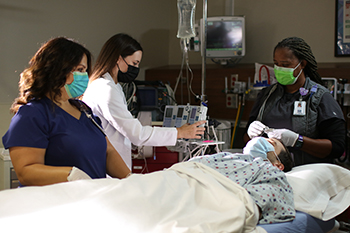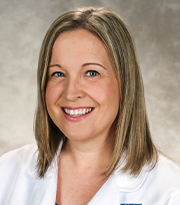PGY-2
Overview
 The PGY-2 Emergency Medicine Pharmacy Residency Program builds on doctor of pharmacy education and PGY-1 pharmacy residency program education. It contributes to the development of clinical pharmacists in the specialized area of emergency medicine. The PGY-2 residency provides residents with opportunities to function independently as practitioners by conceptualizing and integrating accumulated experience and knowledge and incorporating both into patient care or other advanced practice settings. Residents who successfully complete an accredited PGY-2 pharmacy residency are prepared for advanced patient care, academic or other specialized positions, and board certification.
The PGY-2 Emergency Medicine Pharmacy Residency Program builds on doctor of pharmacy education and PGY-1 pharmacy residency program education. It contributes to the development of clinical pharmacists in the specialized area of emergency medicine. The PGY-2 residency provides residents with opportunities to function independently as practitioners by conceptualizing and integrating accumulated experience and knowledge and incorporating both into patient care or other advanced practice settings. Residents who successfully complete an accredited PGY-2 pharmacy residency are prepared for advanced patient care, academic or other specialized positions, and board certification.
The PGY-2 Emergency Medicine Pharmacy Residency Program is accredited with the American Society of Health-System Pharmacists. The PGY-2 Emergency Medicine Pharmacy Residency Program will recruit for one position annually.
Program Structure
 Program Director: Megan Musselman, PharmD, MS, BCPS, BCCCP, BCEMP, DPLA, FCCP, FASHP
Program Director: Megan Musselman, PharmD, MS, BCPS, BCCCP, BCEMP, DPLA, FCCP, FASHP
Emergency Medicine Clinical Pharmacy Specialist; email Megan.Musselman@nkch.org
Residents will complete training in pharmacy operations, required core rotations and a variety of elective rotations during the 12-month residency program. The required rotations comply with ASHP standards and ensure residents acquire the necessary clinical skills to become effective practitioners.
Residents are encouraged to select elective rotations that match their individual preferences and build upon past experiences. Required rotations and elective rotations are outlined below.
About North Kansas City Hospital
North Kansas City Hospital is designated a Comprehensive Cardiac Center, Level II Trauma and Joint Commission Primary Stroke Center. The NKCH Emergency Department has 50 treatment beds, including three time-critical diagnosis rooms, and dedicated areas for urgent care and acute care observation visits. The ED treats approximately 90,000 adult and pediatric patients annually and serves the Kansas City metropolitan area and surrounding rural areas.
- Orientation (2-4 weeks)
- Emergency Medicine Introduction (6 weeks)
- Emergency Medicine Fast Track (6 weeks)
- Emergency Medicine Quality (6 weeks)
- Emergency Medicine Trauma and Pulmonary (6 weeks)
- Neurotrauma Intensive Care Unit (4 weeks)
- Cardiac Intensive Care Unit (4 weeks)
- Toxicology/Poison Control (4 weeks)
- Pediatric Emergency Medicine (4 weeks)
- Repeat Required Rotation (4 weeks)
- Antimicrobial Stewardship (16 weeks)
- Hematological/Oncological (16 weeks)
- Practice Management and Medication Safety (11 months)
- Pre-Hospital/EMS/Emergency Preparedness
- Multidisciplinary Committees (2)
- Code Stroke, Trauma, STEMI and Blue Response and Scheduling
- Research (12 months)
- Includes written summation of results and oral presentation of project to an external audience
- Teaching and Education (12 months)
- Teaching Certificate (if not already obtained)
- Seminar and Toxicology CE Presentation
- Required Lecture for UMKC School of Pharmacy Critical Care Elective
- Staffing (12 months)